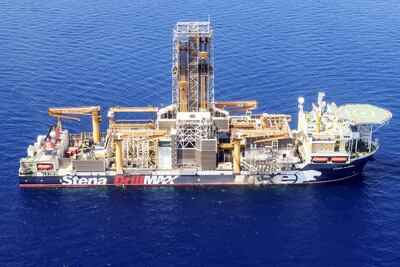Hezbollah chief Hassan Nasrallah on Monday renewed his threats against Israel's plan to extract oil and gas from a disputed gasfield in the Mediterranean Sea.
In June, Israel moved a vessel, operated by London-listed drilling company Energean, to the Karish field. It is expected to go into operation by September.
That offshore field in the eastern Mediterranean is claimed in part by Lebanon. Israel rejects that claim.
“If the extraction of oil and gas starts in September before Lebanon retains its rights, we are heading towards a confrontation,” Mr Nasrallah told Al Mayadeen television.
The interview was part of an event marking 40 years of the founding of Lebanon's Hezbollah, the Iran-backed political party and armed group.
“We have set a goal that we will seek to achieve no matter what, and we will resort to anything to this end,” Mr Nasrallah said.
“The Lebanese state is incapable of making the right decision that would protect Lebanon and its riches, therefore the resistance must take this decision,” Mr Nasrallah said.
There has been a long-running dispute over the gasfield, which was discovered a decade ago.
US-mediated talks about the countries' maritime boundaries began in 2020, but have made little progress.

The talks had been on hold until US energy envoy Amos Hochstein arrived in Beirut last month.
Lebanon is awaiting a response from Israel after relaying its position to Mr Hochstein.
The dispute over Karish reared its head again in June when Israel moved the Energean ship to the gasfield in a move that angered Lebanon.
This month, Israel shot down three unarmed drones flown by Hezbollah that were heading towards Karish field.
Israel and Hezbollah are long-time enemies that fought a month- long war in 2006 and frequently threaten each other.
Israel believes the field, about 80 kilometres west of Haifa, is part of its exclusive economic zone, while Lebanon says it lies within the disputed waters.
In the negotiations, Lebanon had initially demanded 860 square kilometres of territory in the disputed area.
But the talks were complicated last year when Beirut expanded its claim in the zone by about 1,400 sq km, including part of Karish.
An economic crisis that first became apparent in 2019 has plunged much of Lebanon into poverty, with widespread shortages of bread, electricity, water, medicines and other essentials.
Last Friday, dozens of activists, clerics, Hezbollah officials and media professionals descended upon the border in south Lebanon for an event called Our Wealth, a Red Line.
With Lebanese army soldiers watching and what appeared to be an Israeli vessel in the distance off the coast, those present sought to send a message that they would not allow Lebanon’s maritime wealth to be plundered.
Abdel Malik, who described himself as a Lebanese citizen from the Bekaa Valley, told The National he was there to “assist the rights of Lebanon”.
“There are very severe sanctions against Lebanon to prevent Lebanon [from being] rich. The sanctions towards Lebanon [are] to make Lebanon poor.”
He criticised “American sanctions, American efforts to prevent Lebanon to produce gas and petrol from the sea — Lebanon’s sea.
“We are here to say it’s our right and we have the right to produce. Because Lebanese people deserve to live in peace and prosperity.”














